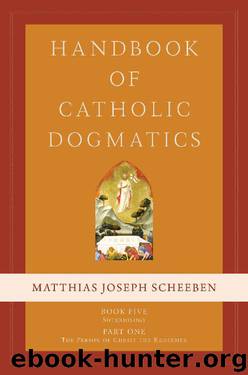Handbook of Catholic Dogmatics 5.1 by Matthias Joseph Scheeben

Author:Matthias Joseph Scheeben [Scheeben, Matthias Joseph]
Language: eng
Format: epub
Publisher: Emmaus Academic
Published: 2020-05-13T16:00:00+00:00
{469} On this topic cf. Book II, nn. 237, 207, and 227 f. In reference specifically to God’s infiniteness, see Thomas Aquinas, In III Sent., dist. 6, q. 2, a. 3 ad 1: “In the composite Person … although there are more goods than in a simple person, because in the former case there is uncreated good and created good: nevertheless the composite Person is not better than the simple; (1) because the created good is to the uncreated good as a point is to a line, since there is no proportion of one to the other; hence as a point added to a line does not make it greater, neither does created good added to the uncreated good in the Person make Him any better; (2) or else because the whole reason for the goodness of all goods is in God, hence He too is called all good; hence no addition can be made to Him of some good that is not in him.”
In reference to God’s immutability, cf. Alexander of Hales, In III Sent., q. 7, m. 3, a. 1: “Some things are united in such a way that a change occurs in both of the united things, such as water with wine; or in only one of them, as when the sunlight is united to the air, the light is not changed in that union nor does it receive some disposition that it did not have before, although now it is illuminating and before it was not; for this does not place a new disposition in the light, but nevertheless it does in the recipient, because it is illuminated now but was not before. Accordingly it should be said that the union of the Word to the flesh causes no change in the Word, but is only a change in the humanity itself, which now receives a ray of divinity whereas it did not before, and for this reason no change has occurred in the eternal light.” And further on: “Something is said to be [se habens] in different ways before [i.e. in itself] and on account of [i.e. after] a change into another thing, which now is related to [se habet ad] that first thing in a different way than before; for example, the sun is said to be illuminating from the action that it has on the air, which it did not have before, and nevertheless it is not changed in itself; but the air is now related differently to the sun than before, while the sun is in the same way. So I say that the Word is no different than it was before; but something is related differently to the Word than before, namely the humanity.”
{470} The strongest appearance (which for human reason can hardly be removed entirely, according to Suarez) of a passive attitude and an intrinsic change of the Divine Person in the Incarnation lies in the fact that 1) here this Person appears as subject of a new form of
Download
This site does not store any files on its server. We only index and link to content provided by other sites. Please contact the content providers to delete copyright contents if any and email us, we'll remove relevant links or contents immediately.
The Lost Art of Listening by Michael P. Nichols(7488)
Why I Am Not A Calvinist by Dr. Peter S. Ruckman(4148)
The Rosicrucians by Christopher McIntosh(3509)
Wicca: a guide for the solitary practitioner by Scott Cunningham(3166)
Signature in the Cell: DNA and the Evidence for Intelligent Design by Stephen C. Meyer(3125)
Real Sex by Lauren F. Winner(3013)
The Holy Spirit by Billy Graham(2943)
To Light a Sacred Flame by Silver RavenWolf(2813)
The End of Faith by Sam Harris(2733)
The Gnostic Gospels by Pagels Elaine(2527)
Waking Up by Sam Harris(2454)
Nine Parts of Desire by Geraldine Brooks(2357)
Jesus by Paul Johnson(2352)
Devil, The by Almond Philip C(2324)
The God delusion by Richard Dawkins(2305)
Heavens on Earth by Michael Shermer(2278)
Kundalini by Gopi Krishna(2180)
Chosen by God by R. C. Sproul(2160)
The Nature of Consciousness by Rupert Spira(2095)
